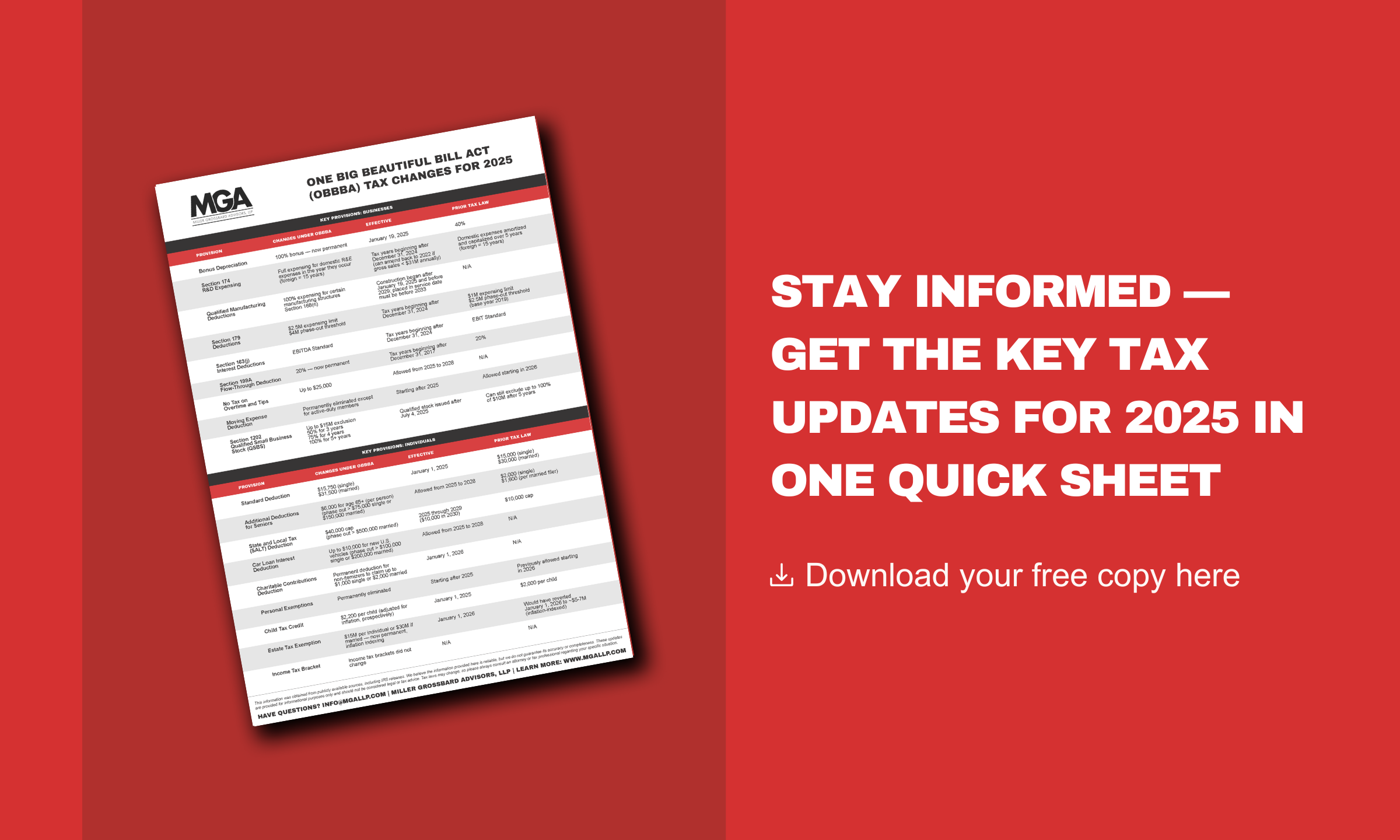THESE NEW RULES WERE AMENDED IN AUGUST 2018. CLICK HERE TO VIEW THE UPDATED INFORMATION.
You cannot pick up a paper or browse your internet homepage without seeing another blurb about the new tax legislation. There are many changes and many areas where clarification will be forthcoming. MGA is helping by sifting through the detail to provide SIMPLE explanations and real-life examples of COMPLEX code and law.
As your trusted advisors here at MGA, we want to make sure you are aware of the new centralized partnership audit rules as they are in effect as of January 1, 2018. Not only do we want to help you understand how these new regulations may affect you, but we also want to share ways in which you may be able to avoid the audit.
Let's Break It Down: What Does This New Rule Mean for You?
This rule allows the IRS to audit and assess taxes at the partnership level, not at the individual partner’s level. The partnership must pay an imputed underpayment at the highest tax rate in effect for the reviewed year. This rule applies to all entities that file partnership tax returns.
3 Ways to Avoid Tax Assessment at the Partnership Level
- Make an election out on the timely filed partnership return (annual election)
Once you make the annual election on a timely filed partnership return for the taxable year, the new partnership audit rules will not govern you. In other words, the IRS cannot audit you at the partnership level for the year you make the election. They must audit at the partner’s level. If you have partners that are partnerships, disregarded entities, trusts and/or estates other than for deceased partners, you cannot make an election out.
- Have all partners amend their tax returns and pay additional tax assessed
If you did not elect out for the reviewed year, and the IRS audit results in tax due, you can avoid the imputed underpayment at the highest rate by having all partners of the reviewed year amend their tax returns to reflect the changes and pay the tax due personally.
- Elect to “push out” the partnership audit adjustment to the partner level within 45 days of the notice of final adjustment
A partnership can elect to “push out” the tax adjustments to the partners rather than paying an imputed underpayment by making a “push out” election within 45 days of the final adjustment notice date. Then the partners are liable for the additional tax, interest, and penalties. The partnership must furnish a “push out statement” to each reviewed year partner no later than 60 days after the final adjustment notice date and file it with the IRS. Each reviewed partner pays its share of the partnership’s imputed tax in the current year, not the reviewed year.
Please note that the new partnership audit rule requires partnerships to elect a partnership representative to replace the current tax matters partner. The partnership representative does not need to be a partner, and you can elect a new one every year. What happens if you don’t choose a partnership representative? The IRS will designate one for you.
Please be aware that ALL entities filing partnership returns MUST revise their partnership/operating agreements to incorporate the new centralized partnership audit regulations. Please consult your attorney regarding the required revisions.
With the uncertainty of changing tax laws, MGA has the experts and experience to act quickly. Please don’t hesitate to reach out to us if you have any questions or concerns about these new regulations.
We are here to make the complex simple.
THESE NEW RULES WERE AMENDED IN AUGUST 2018. CLICK HERE TO VIEW THE UPDATED INFORMATION.
Subscribe Now!
Want to stay up to date with our latest blog posts, educational videos, webinars, and more? Get the newest updates delivered right to your inbox by clicking here to receive instant notifications whenever we publish fresh content. Alternatively, you can opt for our monthly roundup with valuable information and insights from our team of experts. Subscribe today and stay ahead of the curve with us.
.png?width=191&name=mgalogofinal-01%20(3).png)





